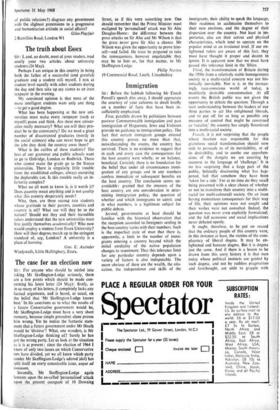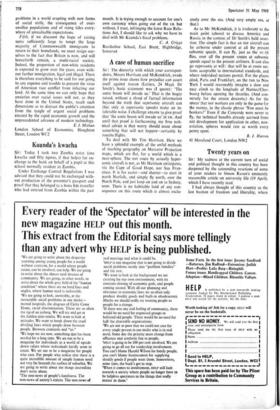Immigration
Sir : Before the hubbub following Mr Enoch Powell's speech dies away, I should appreciate the courtesy of your columns to dwell briefly on a number of facts that have been in- sufficiently emphasised.
First, parallels drawn by politicians between postwar Commonwealth immigration and past immigration of Huguenots, Jews and Irishmen provide no guidance to immigration policy. The fact that certain immigrant groups entered this country proves no more than that, notwithstanding the events, the country has survived. There is no 'evidence to suggest that in each and every case the consequences for the host country were wholly, or on balance, beneficial. Certainly there is no foundation for the belief that under all circumstances immi- gration of any groups and in any numbers , confers immediate or subsequent benefits on the host country. The conclusion seems un- avoidable : granted that the interests of the host country are one consideration in deter- mining immigration policy, the question of whether and which immigrants to admit, and in what numbers, is a legitimate subject for public debate.
Second, governments at least should be familiar with the historical observation that the reception accorded to foreigners settling in the host country varies with their numbers. Such is the imperfect state of man that there is, apparently, a limit to the number of immi- grants entering a country beyond which the initial cordiality of the native population changes to resentment. That this tolerance limit for any particular country depends upon a variety of factors is also indisputable. The more obvious of these are the wealth, the edu- cation, the independence and skills of the immigrants, their ability to speak the language, their readiness to acclimatise themselves to their new environs, and the degree of their dispersion over the country. Not least in im- portanCe, alas are their colour and physical
characteristics, which tend to operate on the popular mind at an irrational level. if our en- lightened rulers are aware of this fact, they must have thought it proper and decent to ignore. It is apparent now that we must have passed this tolerance limit in the 'fifties.
Third, the transformation of Britain during the 1950s from a relatively stable homogeneous society to a multi-racial concern was not his- torically inevitable. Nor is it, in the increas- ingly race-conscious world of today, a manifestly desirable consummation. At all events the British public was not given the opportunity to debate the question. Through a tacit understanding between the leaders of our three parties to act like enlightened liberals, and to put off for as long as possible any measure of control that might be construed as `racialist,' the country has simply floundered into a multi-racial society.
Fourth, it is not surprising that the people whose inaction was responsible for this gratuitous social transformation should now seek to persuade us of its inevitability, or of its desirability, and to soothe our apprehen- sions of the dangers we are courting by recourse to the language of 'challenge.' It is no less surprising that a large part of the public, belatedly discovering what has hap- pened, feel that somehow they have been 'taken for a ride.' For at no time do they recall being presented with a clear choice of whether or not to transform their country into a multi- racial (or multi-coloured) society. On an issue having momentous consequences for their way of life, their opinions were not sought and their wishes were not consulted. Indeed, the question was never even explicitly formulated; and the full economic and social implications never debated openly.
It ought, therefore, to be put on record that the ordinary people of this country were, in this instance at least, the victims of the com- placency of liberal dogma. It may be en- lightened and humane dogma. But it is dogma just the same. And if there is a lesson to be drawn from this sorry history it is that men today whose political instincts are guided by such dogma, and not by ruthless pragmatism and forethought, are unfit to grapple with problems in a world erupting with new forms of social strife, the consequence of over- swollen populations and of rising tides every- where of unrealisable expectations.
Fifth, if we discount the hope of raising sums sufficiently large to tempt the large majority. of Commonwealth immigrants to return to their homelands, we must resign our- selves to the fact that Britain is now, and will henceforth remain, a multi-racial society. Indeed, the proportion of non-white residents is expected to grow over the years, even with- out further immigration, legal and illegal. There is therefore everything to be said for our going to any expense and trouble to prevent the virus of American race conflict from infecting our land. At the same time we can only hope that anxieties over racial issues will not, as they have done in the United States, reach such dimensions as to distract the public's attention from the tangle of urgent social problems created by the rapid economic growth and the unprecedented advance of modern technology.
E. I. Mishan London School of Economics, Houghton Street, London WC2







































 Previous page
Previous page